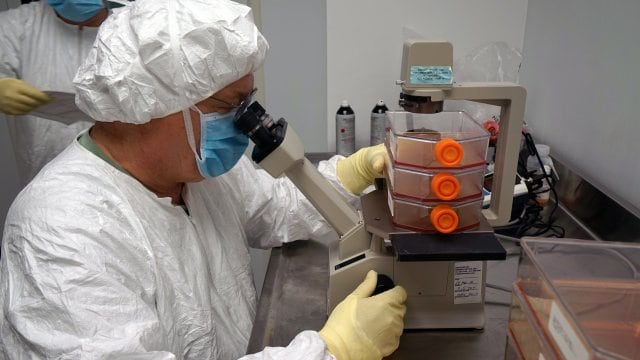An Army lab that houses Ebola virus and other infectious diseases has been shutdown due to violations found in June by the Centers for Disease Control and Prevention, a CDC spokeswoman confirmed to Army Times on Thursday.
But officials say there were no associated health risks.
The U.S. Army Medical Research of Institute of Infectious Diseases at Fort Detrick, Maryland, is at a standstill until the violations are fixed and it is re-instated with the Federal Select Agents Program, which allowed it to handle dangerous biological specimens.
“CDC can confirm FSAP has suspended USAMRIID’s registration with the Federal Select Agent Program until USAMRIID corrects deficiencies that have been identified by FSAP,” Sharon Hopkins said.
Hoskins did not provide further details of the lab’s compliance issues.
The lab’s suspension began July 18, according to a USAMRIID spokeswoman.
The issues stemmed from a May 2018 incident in which Fort Detrick’s steam sterilization plant, which handles biowaste, failed. After that, the lab transitioned to a chemical system to treat wastewater.
“The new system necessitated numerous changes in laboratory infrastructure, procedures, and work practices that substantially increased the complexity of operating in containment laboratories,” Caree Vander Linden told Army Times. “Mechanical issues and human error were among the issues cited by CDC in issuing the suspension.”
But, she added, there were no risks to employees, public health or the environment because of the lapses, and no infectious agents were found outside of the lab’s containment areas.
USAMRIID, a Defense Department lab under Army Medical Research and Development Command, primarily does research with the goal of protecting troops who might come in contact with biological agents while deployed.
According to their website, they also investigate outbreaks and other public health risks, with an eye toward prevention policy and treatments, if possible.
RELATED

USAMRIID has been working on an Ebola vaccine, and in March announced that the Food and Drug Administration had agreed to let it infect rhesus macaque monkeys with active virus in order to test the developing cure.
That research is now on hold, until USAMRIID is back in CDC compliance.
“Operations will resume when the Institute meets or exceeds all requirements identified by the CDC and the U.S. Army,” Vander Linden said. “At this time, there is no target date for resuming full operations.”
Meghann Myers is the Pentagon bureau chief at Military Times. She covers operations, policy, personnel, leadership and other issues affecting service members.





